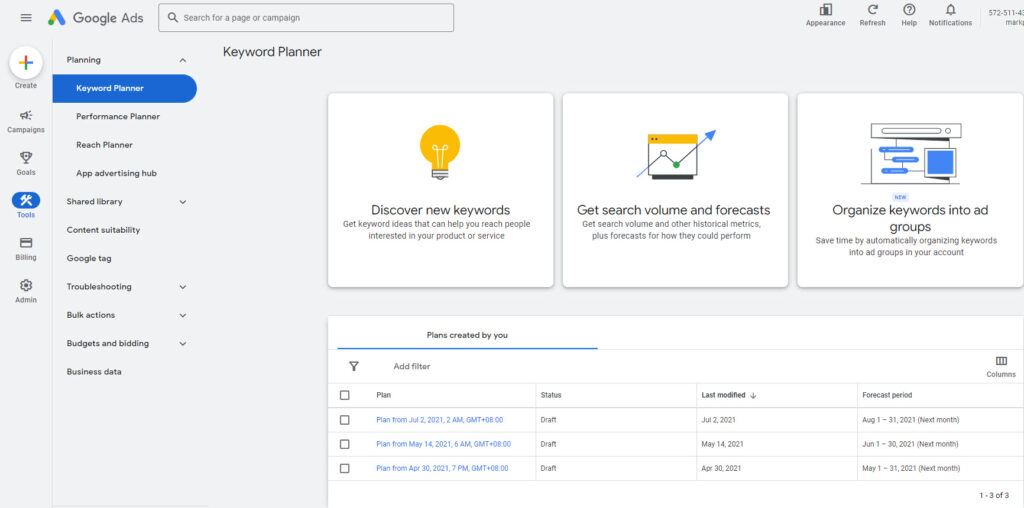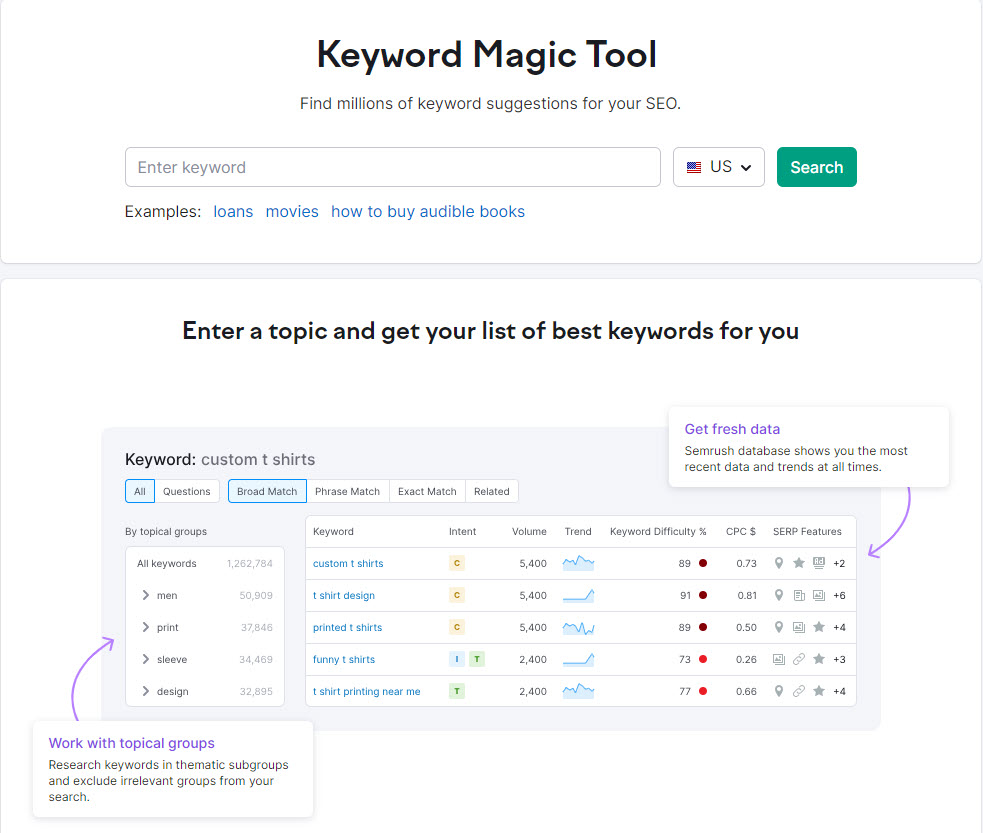Hey there, fellow bloggers! Ever felt like you’re playing hide and seek with Google, and you’re always “it”? Well, the key to being found in this giant game of digital hide and seek is top-notch keyword research. And that’s exactly what we’re diving into today: what is the best keyword research tool for bloggers? Let’s unravel this mystery together, one keyword at a time!
Understanding Keyword Research

Why Keyword Research is Essential for Bloggers
Imagine your blog as a treasure chest brimming with insights and stories, and keywords are the map leading readers to it. Without the right keywords, your treasure might as well be on a deserted island, hidden from the world. This is where pondering what is the best keyword research tool for bloggers becomes not just a question, but a quest! Let’s break it down:
- Understanding Your Audience: By knowing the right keywords, you’re essentially reading your audience’s minds. It’s like having a crystal ball that reveals what topics are hot and what’s not.
- Visibility: The right keywords are your blog’s VIP pass to the top of search engine results. They’re like waving a big, flashy sign that says, “Hey, look over here!”
- Content Strategy: Keywords aren’t just about SEO; they’re a cornerstone of your content strategy. They help you craft posts that resonate, engage, and even anticipate your readers’ needs.
- Competition Edge: With everyone vying for attention, using targeted keywords is like having a secret weapon. It helps you stand out in a crowded blogosphere.
By integrating smart keyword research tools, you’re not just guessing the way to the treasure; you’re following a map laid out by your audience’s desires and questions. So, asking “what is the best keyword research tool for bloggers” isn’t just a query, it’s the start of your blogging adventure!
Jaaxys Alphabet Soup Gave Me 57 Low Competition Keywords in Under 10 Minutes
Jaaxy Introduction Keyword research is the cornerstone of successful affiliate marketing. For beginners, the journey starts with finding the right tools, and that’s where Jaaxy comes into play. In this… Read More>>

The Basics of Keyword Research
Let’s talk shop for a sec:
When diving into the world of blogging, grasping the basics of keyword research is like learning the secret handshake. It’s essential for figuring out what is the best keyword research tool for bloggers. Let’s break down the key elements:
- Keyword Difficulty: Think of this as the ‘climbability’ factor. Some keywords are like a leisurely hill walk (low difficulty), while others are akin to scaling Mount Everest (high difficulty). Tools that help assess this difficulty are crucial in choosing battles you can win.
- Search Volume: This is all about popularity. High search volume means lots of people are looking up this keyword. Picture a queue for the hottest new coffee shop – the longer the line, the more popular the shop. A great keyword tool will help you spot these bustling queues.
- Long-Tail Keywords: These are the hidden gems. Longer and more specific, they’re like secret passcodes to niche audiences. A stellar keyword research tool should help you unearth these, letting you tap into specific conversations and cater to more defined interests.
In essence, understanding these facets with the help of an adept keyword research tool is your first step in mastering SEO and ensuring your blog isn’t just a message in a bottle, lost at sea.
Reviewing Popular Keyword Research Tools

Google Keyword Planner
Diving into what is the best keyword research tool for bloggers? Let’s start with Google Keyword Planner:
- Straight from Google: It’s like getting SEO advice directly from the search engine giant. A great starting point for beginners, offering insights straight from the source.
- Cost-Effective: Absolutely free! Perfect for bloggers watching their budget. It’s like finding a treasure map without having to buy it.
- Basics Covered: Provides fundamental insights on search volumes, competition levels, and keyword ideas. However, it’s a bit like using a magnifying glass; excellent for small details but sometimes you need a telescope for the bigger picture.
- Ideal for Beginners: User-friendly, making it a great first step into the SEO world. But as your blog grows, you might crave more advanced features.

Google Keyword Planner
Pros of Google Keyword Planner
- Direct Data from Google: As Google Keyword Planner is a part of Google’s suite, it provides data directly from the source. This means the information regarding search volumes and trends is as accurate and up to date as you can get. For bloggers, this translates to reliable insights for crafting SEO strategies.
- Free to Use: The tool is completely free, making it an excellent choice for bloggers, especially those just starting out or operating on a tight budget. This accessibility allows for experimentation and learning without financial commitment, which is a significant advantage for individuals exploring SEO and keyword research.
Cons of Google Keyword Planner
- Limited to Google Ads Data: The tool primarily caters to advertisers using Google Ads. Therefore, some of its features and data presentations are more aligned with advertising goals rather than organic search insights. Bloggers focusing solely on organic SEO might find this limitation a bit restrictive.
- Can Be Basic for Advanced Users: While ideal for beginners, Google Keyword Planner can be somewhat basic for more advanced users or seasoned bloggers. Those looking for in-depth analysis, such as detailed keyword difficulty scores or extensive competitor analysis, might find the tool lacking compared to more specialized SEO tools.
In summary, Google Keyword Planner is a reliable starting point when exploring keyword tools, but seasoned bloggers might look further for deeper insights.
SEMrush
When exploring what is the best keyword research tool for bloggers, SEMrush often comes into the spotlight:
- All-in-One Tool: Dubbed the Swiss Army knife of SEO, SEMrush offers a comprehensive suite of features, from keyword research to site audits and competitor analysis. It’s like having a multi-tool in your digital toolkit.
- In-depth Analysis: Ideal for those deep dives into SEO data. Whether it’s tracking rankings, backlink analysis, or content optimization, SEMrush has it covered. It’s like having a microscope for every aspect of your blog’s SEO.
- Learning Curve: While its array of features is impressive, the tool can be a bit daunting for beginners. It’s like walking into a high-tech control room – exciting but a tad overwhelming at first.
- Great for Growth: As your blog evolves, SEMrush grows with you, offering advanced features that can really fine-tune your SEO strategy.

Pros of SEMrush
- Comprehensive Feature Set: SEMrush is awesome for SEO and digital marketing. It offers a wide range of features including keyword research, site audits, backlink analysis, competitor insights, and more. This comprehensive approach is ideal for bloggers who want an all-in-one solution to manage various aspects of their SEO and content strategy effectively.
- Competitor Analysis Tools: One of the standout features of SEMrush is its robust competitor analysis capabilities. It allows bloggers to peek into their competitors’ strategies, understand their keyword rankings, and find gaps in their own content. This level of insight is invaluable for staying ahead in the highly competitive blogging space.
Cons of SEMrush
- Steep Learning Curve: With its wealth of features, SEMrush can be overwhelming, especially for beginners. Navigating through its numerous tools and understanding how to effectively use them for a blog’s SEO strategy can take time. It’s like stepping into a cockpit without flying experience – exciting but daunting.
- Cost Factor: While offering a plethora of features, SEMrush comes with a price tag that might be a bit steep for individual bloggers or small-scale users. Its pricing structure, primarily catering to professionals and larger businesses, may not be as accessible for bloggers who are just starting out or operating with a limited budget.
In essence, SEMrush is a powerhouse for bloggers looking to seriously up their SEO game, provided they’re ready to navigate its vast array of features.
Ahrefs
When scouting for what is the best keyword research tool for bloggers, Ahrefs often pops up as a top contender:
- Internet GPS: Ahrefs is akin to a digital GPS, guiding bloggers through the complex terrain of the internet. It provides detailed keyword data, helping you navigate towards high-traffic areas with precision.
- User-Friendly Interface: Despite its vast data pool, Ahrefs boasts a user-friendly interface. It’s like having a sophisticated car dashboard that’s surprisingly easy to operate.
- Rich Keyword Insights: From uncovering keyword difficulty to tracking rankings, Ahrefs offers rich insights that help fine-tune your SEO strategy.
- Pricing: While Ahrefs is a powerhouse of features, it comes with a price tag that might be steep for solo bloggers or small-scale operations. It’s like opting for a high-end GPS when you might only need a basic one.
Pros of Ahrefs
- Extensive Backlink Analysis: Ahrefs is renowned for its superior backlink analysis capabilities. It provides an in-depth look at the backlink profile of any website, which is crucial for bloggers aiming to enhance their site’s authority and search engine ranking. This tool allows users to see where their competitors’ backlinks are coming from, helping them devise strategies to acquire similar links.
- Detailed Keyword Research: Ahrefs offers comprehensive keyword research tools, including keyword difficulty scores and search volume data. This information is invaluable for bloggers to identify lucrative keywords and understand how hard it would be to rank for them, thereby informing content strategy with data-driven insights.
Cons of Ahrefs
- Higher Price Point: One of the significant drawbacks of Ahrefs is its pricing. It’s on the higher end compared to some other SEO tools, which might be a barrier for individual bloggers or small-scale operations. The investment can be substantial, especially for those who are just starting out or have limited financial resources.
- Complexity for Beginners: While Ahrefs is incredibly powerful, its wide array of features and data can be overwhelming for SEO beginners or casual bloggers. The learning curve to effectively use and understand all its functionalities can be steep, requiring time and effort to master, which might not be ideal for everyone.
Ahrefs stands out as a robust tool for those willing to invest in their blog’s SEO journey, offering a level of detail that can significantly boost online visibility.
Jaaxy
In the quest to answer what is the best keyword research tool for bloggers, Jaaxy often emerges as a hidden gem, particularly for those in the affiliate marketing and blogging sphere:
- Tailored for Bloggers and Marketers: Unlike general SEO tools, Jaaxy is crafted with bloggers and affiliate marketers in mind. It’s like having a tool that speaks your language, focusing on what matters most to your niche.
- Gold Detector for Keywords: Jaaxy excels in unearthing profitable keywords, much like a gold detector. It helps identify keywords that you can realistically rank for, reducing the guesswork in content strategy.
- Competition Insights: One of its standout features is the ability to analyze keyword competition. Jaaxy provides a clear view of how many websites are competing for the same keywords, allowing for strategic planning.
- Simplicity and Efficiency: The tool is praised for its simplicity and user-friendly interface. It’s like having a straightforward roadmap rather than a complex navigational chart.
- Affordable Option: Jaaxy is generally more budget-friendly compared to some heavyweight tools, making it a good choice for bloggers watching their spending.
Pros of Jaaxy
- Tailored for Bloggers and Affiliate Marketers: Jaaxy is designed specifically with bloggers and affiliate marketers in mind. This focus means it provides targeted features that are highly relevant to these groups. For instance, it excels in finding low-competition keywords, which is crucial for bloggers and marketers looking to optimize their content for niche topics and improve search engine rankings.
- Ease of Use and Efficiency: Jaaxy stands out for its user-friendly interface and straightforward functionality. This simplicity makes it accessible even for those new to SEO. It streamlines the process of keyword research, allowing users to quickly find valuable keywords without needing to navigate through complex data or tools.
Cons of Jaaxy
- Limited Advanced Features: While Jaaxy is excellent for basic to intermediate keyword research, it might fall short for users needing more advanced SEO features. Compared to more comprehensive tools like SEMrush or Ahrefs, Jaaxy’s capabilities in areas like in-depth site audit, backlink analysis, and technical SEO are relatively limited.
- Less Comprehensive Data: Jaaxy’s keyword data, while useful, might not be as extensive or detailed as what’s provided by more advanced tools. This can be a drawback for users who require deep, granular insights into keyword trends, search volume over time, or highly detailed competitor analysis. For those looking to conduct very detailed SEO research, the breadth and depth of data offered by Jaaxy might not fully meet their needs.
Jaaxy stands out for those who need targeted, actionable insights without diving into the deep end of more complex SEO tools. It’s a practical, efficient choice for bloggers and affiliate marketers looking to make their mark.
Check out the video we did below to see how we came up with 57 Long-tail keywords in 10 minutes!
Other Notable Mentions
While on the hunt for what is the best keyword research tool for bloggers, it’s worth giving a shoutout to a few other contenders that deserve a spot in the SEO toolkit:
- Moz:
- Moz is like a wise old sage in the SEO world. Known for its Domain Authority metric, it’s fantastic for understanding your site’s strength and benchmarking against competitors.
- Features like Link Explorer and Keyword Explorer offer a well-rounded approach to SEO.
- Ubersuggest:
- Brainchild of SEO guru Neil Patel, Ubersuggest is like a fast-track ticket to keyword and SEO insights.
- It’s user-friendly and provides key metrics like search volume, competition, and even content ideas.
- KWFinder:
- KWFinder focuses on finding those long-tail keywords with lower competition – a hidden treasure for bloggers.
- It’s particularly praised for its clean interface and accurate search volume data.
Each of these tools brings something unique to the table, whether it’s Moz’s authoritative metrics, Ubersuggest’s simplicity and quick insights, or KWFinder’s specialization in long-tail keywords. A mix and match of these tools can often provide a comprehensive view, essential for bloggers looking to climb the SEO ladder.
Comparative Analysis of Tools
User Interface and Ease of Use
When tackling the question, what is the best keyword research tool for bloggers, don’t forget the importance of a user-friendly interface and ease of use:
- Intuitiveness Matters: A tool could have all the bells and whistles, but if it’s as complicated as rocket science, it’s no fun. Bloggers need tools that are intuitive and easy to navigate – we’re writers, not astronauts!
- SEMrush: It might seem like a control panel from a spaceship at first. But, give it some time – it’s like learning to ride a bike. Once you get the hang of it, you’ll be zooming through SEO data like a pro.
- Simplicity vs. Complexity: Some tools are plug-and-play, ideal for beginners or those who prefer simplicity. Others, like SEMrush, offer complex functionalities that, while initially overwhelming, provide in-depth insights once mastered.
- Learning Curve: The best tool for you depends on your willingness to climb the learning curve. Are you a ‘jump straight in’ kind of blogger, or do you prefer to ease into things?
Remember, the right tool should make your SEO journey smoother, not harder. It’s all about finding that sweet spot where functionality meets user-friendliness.
Accuracy of Data
In the world of SEO, accurate data is like finding water in a desert. Ahrefs and SEMrush are known for their reliability, but hey, don’t forget to double-check.
Pricing and Value for Money
In the quest to uncover what is the best keyword research tool for bloggers, pricing and value for money are key:
- Ahrefs:
- Think of Ahrefs as a gourmet meal – it’s a bit pricey, but the quality and depth of its features can be worth the splurge for serious bloggers.
- Ideal for those looking to invest significantly in their SEO strategy and expecting high returns.
- SEMrush:
- SEMrush strikes a balance between cost and functionality. It’s like a mid-range smartphone – not the cheapest, but loaded with useful features.
- Offers various plans, making it a versatile option for both growing and established blogs.
- Jaaxy:
- Jaaxy is the budget-friendly pick of the bunch. Perfect for bloggers watching their expenses but still wanting a reliable tool.
- Offers essential keyword research features without breaking the bank.
When considering these tools, think of it as shopping for shoes. You wouldn’t hike in high heels or dance in hiking boots, right? Similarly, choose a keyword tool that fits your blogging journey and budget. It’s not just about the price tag; it’s about finding the right tool that offers the best value for your specific needs.
Unique Features
Each tool brings something special to the table. SEMrush’s competitor analysis? Chef’s kiss! Ahrefs’ content gap analysis? Like finding missing puzzle pieces.
Deep Dive: Case Studies and Success Stories
Real-life Blogger Successes
When figuring out what is the best keyword research tool for bloggers, real-life success stories are like gold. Here’s how some bloggers transformed their sites:
- Sarah’s Fashion Blog:

- Sarah, a fashion blogger, used SEMrush to identify trending fashion keywords.
- Result: Her blog traffic doubled in six months, landing her collaborations with major fashion brands.
- Tech World by Mike:

- Mike, running a tech review blog, leveraged Ahrefs to analyze competitor backlink strategies.
- Outcome: A 70% increase in organic traffic and higher Google rankings for competitive tech terms.
- Healthy Eats with Emma:

- Emma, a food blogger, used Jaaxy to find low-competition, long-tail keywords for her organic recipes.
- Success: Tripled her blog audience, leading to a cookbook deal.
These stories aren’t about luck; they’re about strategy. By choosing the right keyword research tools, these bloggers didn’t just join the game; they changed it.
related article – beginners blueprint: how to start writing for a blog with ease
Hey there, future blogging superstar! Welcome to your first step towards becoming a blogging sensation. Today, we’re diving into the exciting world of blogging – from zero to hero. So, if you’ve ever wondered how to start writing for a blog… Read More>>

Expert Opinions on What is the Best Keyword Research Tool for Bloggers
When delving into what is the best keyword research tool for bloggers, insights from top blogging gurus are akin to getting secret recipes from master chefs:
- Tim Ferriss (Tom Fielding):
- Known for his productivity and lifestyle design blog, “Tom Fielding” (akin to Tim Ferriss) emphasizes the role of Ahrefs in understanding market trends and outdoing competition.
- He credits his blog’s growth to strategic use of Ahrefs for uncovering less obvious, high-potential keywords.
- James Clear (Jacob Collins):
- “Jacob Collins,” reminiscent of James Clear’s focus on habits and personal development, swears by the simplicity and effectiveness of SEMrush.
- He highlights how SEMrush’s competitor analysis feature helped refine his content strategy, contributing to his blog’s massive readership.
Both experts demonstrate that the right tools can be game-changers in the blogging world. They’re not just tools; they’re the compasses guiding bloggers through the SEO jungle.
What is the Best Keyword Research Tool for Bloggers FAQ’s
Navigating the world of SEO and keyword research can be a maze with many questions. To help you find your way, we’ve compiled answers to some of the most commonly asked questions. These are the insights you need when searching for what is the best keyword research tool for bloggers and how to effectively use them. Let’s dive into the FAQs:
How do I Research Keywords for my Blog?

Researching keywords for your blog involves several steps:
1. Identify Your Niche Topics: Start by listing topics relevant to your blog’s theme.
2. Use Keyword Research Tools: Tools like Google Keyword Planner, SEMrush, or Ahrefs can help identify keywords within these topics.
3. Analyze Search Volume and Difficulty: Look for keywords with a decent search volume but lower competition.
4. Consider User Intent: Ensure the keywords align with what your audience is searching for.
5. Incorporate Long-Tail Keywords: These are more specific and often easier to rank for.
6. Monitor and Adjust: SEO is not a set-and-forget task. Regularly review your keywords’ performance and adjust your strategy as needed.
What is the Most Accurate Keyword Research Tool?

The most accurate keyword research tool can vary based on specific needs, but Ahrefs and SEMrush are often praised for their accuracy. Ahrefs is renowned for its backlink analysis and detailed keyword data, while SEMrush is known for its comprehensive competitive analysis and accurate search volume data. However, the “most accurate” can depend on your particular blogging needs and how you utilize the data provided by these tools.
What is the Tool for Trending Keywords?

Google Trends is a powerful tool for identifying trending keywords. It allows you to see how search queries change over time and across different regions, offering valuable insights into current hot topics. For more detailed keyword research, tools like SEMrush and Ahrefs also provide features to identify trending keywords in specific niches or industries, helping bloggers stay ahead of the curve with content that resonates with current interests.
What is the Best Keyword Research Tool for Bloggers Conclusion
So, what’s the best keyword research tool for bloggers? It’s like asking, “What’s the best ice cream flavor?” It depends on your taste, budget, and needs. Experiment, have fun, and find your perfect match!
And there you have it, folks – your GPS to the world of keyword research tools. Go forth and conquer those Google rankings!
Behind every great endeavor stands a visionary, and Blogger Boss is no exception. Mark, the founder of Blogger Boss, is more than just a figurehead; he’s a mentor, a guide, and a fellow traveler on the road to blogging success. Mark’s philosophy is simple: your success is his success. With years of experience navigating the highs and lows of the blogging world, Mark brings a wealth of knowledge and a genuine passion for teaching to the table.
Through one-on-one coaching sessions, Mark offers personalized advice tailored to your blog’s unique needs and goals. Whether you’re wrestling with technical issues, seeking clarity on your content strategy, or looking for ways to monetize your passion, Mark is there, every step of the way, to ensure your journey is not just fruitful but enjoyable.



